Extremely high new and used car prices have forced buyers to seek out "older" vehicles as a way to better fit their budgets. And of course, buying an "older" vehicle then raises the risk of costly maintenance and reliability issues. So, these factors have become of prime importance to these buyers.
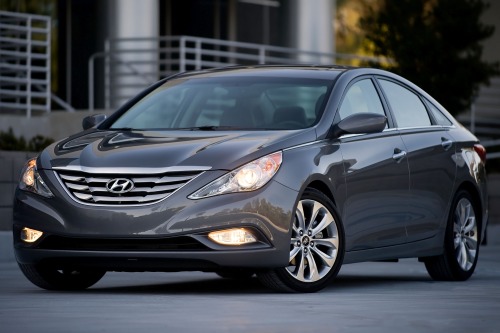
Fortunately, an older Hyundai that has aged well is a distinct possibility for filling this need. While all older vehicles have had mechanical issues, as have Hyundais, they have proven to be a reasonably reliable brand over time. Better than most, in fact. Of course, careful and patient shopping is required.
So here, we'll take a look at Hyundai reliability, the pros and cons of some of their more popular older offerings, and a specific machanical problem watchlist to check for before purchase.
Hyundai Reliability
Hyundai began a significant effort to improve the reliability and quality of their vehicles in the early 2000s. Prior to that time, Hyundai had a reputation for producing budget-friendly cars, but they were often criticized for their durability and build quality.
In 2004, after making extensive quality related changes, Hyundai put their money where their mouth is and introduced their "Hyundai Assurance" program, which included a 10-year/100,000-mile powertrain warranty. This confidence in their own reliability was a major step in building trust and confidence among consumers. It was one of the longest in the industry at the time, signaling Hyundai's commitment to standing behind the quality of their vehicles.
Since then, Hyundai has continued to make improvements in their vehicles, addressing quality and reliability concerns through better manufacturing processes, research and development, and enhanced engineering. As a result, their vehicles have become more reliable and competitive in the marketplace.
Of course, this doesn't mean that Hyundais are maintenance free. But it does mean that this long-term emphasis on quality and reliability has improved their vehicles to the point where they can be included as a possible "older" choice today.
So here, we'll review the pros and cons of some of these older Hyundai models as well as some possible mechanical issues to check before purchase.
Pros And Cons Of Some Popular Older Hyundai Models
The improvement in Hyundai vehicle reliablity has resulted in older vehicles with the features and build quality that make many of them very viable and economical used car options today, more so than many of their competitors. If you are looking for an older used vehicle that offers a combination of affordability, features, quality and fuel economy, then Hyundais are well worth a look.
Hyundai Accent: The Accent has earned praise for its spaciousness considering it's a compact car, long standard features list, good gas mileage, surprising acceleration and nimble handling.
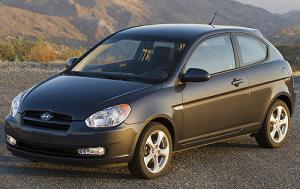
Hyundai's smallest car got a redesign for the 2006 model year (its third generation that carried through until a redesign for 2012) which added size, power, and additional safety features. And while it originally debuted as a GLS four-door sedan, a new sporty two-door hatchback model was introduced as a 2007 model.
There are four models available from this generation: the Blue (introduced in 2010), GS and the SE are two-door hatchbacks, while the GLS is a four-door sedan.
The fourth-generation Accent, produced from 2012 - 2017, was available in both sedan and hatchback body styles and featured an attractive and modern exterior design. It also featured a 1.6-liter four-cylinder engine, producing 138-horsepower and the choice of a 6-speed manual or automatic transmission.
You May Also Like:
Easy Negotiation Tactic To Buy A New Car At The Lowest Price
Do This To Get The Best Price For Your Trade-In
How To Get The Lowest Rate Car Loan
The interior is also relatively roomy for a subcompact, with a user-friendly dashboard layout and a good set of standard features, including air conditioning, a USB port, a 4-speaker audio system, and an auxiliary input jack. Higher trim levels can be found with optional packages that included additional features like Bluetooth connectivity, power windows and locks, cruise control, and a premium audio system.
Accent Overall Pros: Attractive pricing, nice highway ride, roomy cabin, comfortable seats, good gas mileage.
Overall Cons: Uninspired acceleration with automatic transmission, not a smooth ride on rough surfaces, low side-impact crash ratings.
Hyundai Elantra: The Elantra has an easier, smoother and quieter drive than one would expect from an economy sedan. Performance, maneuverability and handling are all excellent, while its suspension smooths out the rough spots well. Its acceleration is very good and is particularly impressive on models with the manual shift. Gas mileage performance is another plus.
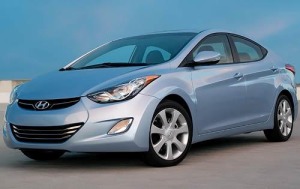
The Hyundai Elantra has long been a solid choice in the economy sedan segment. But with its total redesign for the 2011 model year (this generation was produced through the 2014 model year), it really jumped to the head of its segment with a new head-turning design, outstanding fuel efficiency, comfortable interior, generous trunk space, long list of standard safety equipment, surprisingly upscale optional features and lots of bang for the buck.
Also considered a viable and economical choice is the generation (its fourth) produced for the 2007 through 2010 model years. And while there is a four-door hatchback known as the Elantra Touring from this production run, it is primarily a sedan available in two models: GLS and SE.
There was a third trim in this generation, the Limited, but it was discontinued for 2008 and replaced with an options package for the SE.
2008 also marked the addition of brake assist and stability control to the SE as standard features. And for the 2009 model year, the tuning for both the suspension and steering were revised and the USB/iPod audio jack was made available.
Elantra Overall Pros: Smooth and capable ride, high-quality cabin for the segment, roomy interior, long list of features, value price.
Elantra Overall Cons: Drive not as sporty and some cheap interior materials in pre-2011 models, limited rear headroom in 2011 and later models.
Hyundai Genesis: When it comes to the luxury car segment, the Hyundai Genesis is an outstanding value for the dollar. Reviews all over the internet pretty much agree that the Genesis is a great car at a great price. So good, in fact, that it won the prestigious 2009 North American Car of the Year award in its first year of production.This first-generation Genesis was produced through 2014.
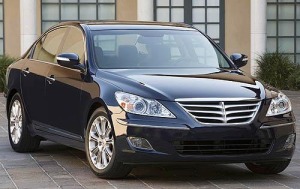
Its elegant exterior design clearly demonstrates the lines, cut and workmanship of a luxury sedan. Inside, the cabin continues this sophisticated ambiance with an attractive upscale design, high quality materials and soft-touch surfaces. There's also generous room for passengers, both front and rear, with comfortable and supportive seating.
On the road, the Hyundai Genesis cruises effortlessly, quietly and extremely smoothly ... nearly oblivious to road bumps and irregularities. There's plently of power and refinement in the V6 that will satisfy most drivers, but it's the 375 horsepower V8 that really shines, and with only a small sacrifice to fuel efficiency. (Gas mileage for the V6 is EPA rated at 18 mpg city and 27 mpg highway, while the V8 comes in at 17 city and 25 highway.)
Genesis Overall Pros: Powerful and smooth engines, spacious cabin, comfortable ride, lots of features, excellent crash test ratings, a lot of car for the money.
Genesis Overall Cons: Lackluster stereo performance, doesn't offer an all-wheel-drive model, backseat doesn't fold down.
Hyundai Genesis Coupe: Debuting for the the 2010 model year and produced through 2016, the first-generation Hyundai Genesis Coupe combines sharp handling, a sophisticated chassis, a head-turning design, a sporty cabin and attractive pricing.
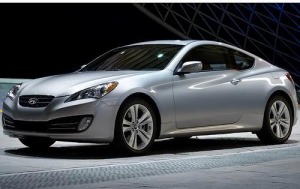
While uplevel models are outfitted with a 306-horsepower 3.8-liter V6 engine, the base engine is a 212-horsepower 2.0-liter turbocharged four-cylinder. Both engine choices are matched to a standard 6-speed manual transmission, with a 5-speed automatic available on the four-cylinder and a 6-speed automatic available on the V6.
Even the entry-level 2.0T comes very well equipped with standard features that include 18-inch alloy wheels, 12.6-inch antilock disc brakes, a front strut brace, projector beam headlamps, power windows, air conditioning, leather-wrapped steering wheel and shift knob, steering wheel audio controls, AM/FM/XM/CD/MP3, trip computer, cruise control, Bluetooth, iPod connectivity, electronic stability control, active head restraints, and front/side/curtain airbags.
Genesis Coupe Overall Pros: Athletic handling, comfortable ride, lively engines, sporty looks, value priced.
Genesis Coupe Overall Cons: Steering wheel doesn't telescope, so-so sound system, somewhat confusing iPod interface.
Hyundai Santa Fe: The Santa Fe has been providing solid performance at discount prices since its inception in 2001. And within the fast growing midsize crossover SUV segment, the Santa Fe only got better since.
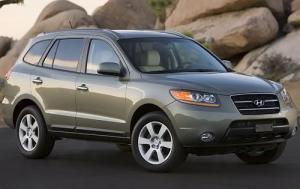
The second-generation Santa Fe was produced from 2007 through 2011 and can be found in three trims: GLS, SE and Limited. These Santa Fe's have performed well as practical and family-friendly SUVs.
And those with the larger V6 engine are particularly smooth and have ample power. While certainly not designed to be dynamic and athletic street performers, this Sante Fe is easy to control and has well-mannered handling, despite its fairly heavy size.
The third-generation Santa Fe was then produced through 2018. This version featured a comfortable and spacious interior, offering seating for up to five passengers with an optional third-row. This Santa Fe came with two engines, a 2.4-liter four-cylinder or a more powerful 3.5-liter V6, both mated to a six-speed automatic transmission.
It was praised for its well-balanced ride and wide array of standard features, including Bluetooth connectivity and satellite radio.
Santa Fe Overall Pros: Attractive interior, high safety scores, optional third row, value priced.
Santa Fe Overall Cons: Mediocre driving dynamics, firm ride quality in SE and Limited models.
Hyundai Sonata: It was really the two generations produced from 2006 to 2014 when the Sonata hit it's very good stride and became a leader in its segment, challenging the Honda Accord and Toyota Camry.
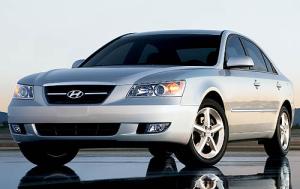
The Sonata redesigned for the 2011 model year offers a myriad of appealing qualities, including its sleek design, smooth drive, capable handling, spacious interior, impressive feature list, large trunk, excellent safety ratings, and strong value for the dollar.
In addition to its impressive materials quality and solid construction, the powertrain offers both surprising athleticism and power while still delivering high fuel mileage. And with more standard features than most competitors, this Sonata version with lower miles is well worth consideration.
Sonata Overall Pros: Impressive interior, smooth ride, roomy interior, large trunk, long list of features, attractively priced.
Sonata Overall Cons: V6 slightly underpowered and somewhat numb steering in pre-2011 models.
Hyundai Tucson: We like the second-generation introduced with the 2010 model year and produced through 2014. It's definitely an attractive and value-oriented choice in the compact SUV segment thanks to a long list of safety features, car-like performance and handling, and a spacious and pleasing cabin design.
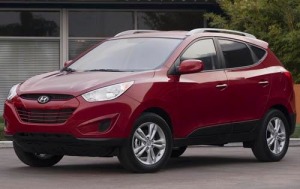
Standard features on the already well-equipped base GLS model includes full power accessories, keyless entry, air conditioning, hill descent control, a hill-holder feature, a trip computer, a tilt steering wheel, a height-adjustable driver seat, 17-inch steel wheels and a 6-speaker audio system with a CD player, satellite radio, a USB port with an iPod interface, and auxiliary audio jack.
With its nicely-weighted electric power steering system and European-styled suspension tuning, the Tucson provides a sportier and more athletic drive than other top competitors in this segment. Some might find the sporty suspension a bit firm, however, as there is a trade-off between a firmer suspension and ride softness. This is more noticable with the larger 18-inch wheels.
Tucson Overall Pros: Attractive and well-equipped cabin, nimble handling, good gas mileage, value priced.
Tucson Overall Cons: Firm ride quality, below-average storage room.
Older Hyundai Mechanical Problem Watchlist
Older Hyundai models are generally considered to have proven to be reasonably reliable vehicles. It's important to note that while these reliability issues below have been reported in some Hyundai models, there are many well-maintained and trouble-free older Hyundais on the road.
Individual vehicles can be impacted by driving conditions, maintenance regularity, mileage and promptness of repairs.
More Car Buying Tips:
Is It A Good Time To Buy A New Toyota?
This One Tip Will Save Thousands On Car Insurance
Use Auto Lease Residual Value To Your Advantage
If you are serious about buying an older Hyundai, the following are some of the more common issues and mechanical problems that have been reported and should be checked before purchase:
Transmission Problems: Some Hyundai models from this era experienced transmission issues, including erratic shifting, slipping, or failure. Regular maintenance of the transmission, including fluid changes, may have helped mitigate this problem.
Suspension and Steering Component Wear: Suspension components, such as ball joints and control arms, could wear out over time, leading to uneven tire wear and a rough ride. Steering issues like loose tie rods were also reported in some models.
Electrical Problems: Older Hyundai vehicles might encounter electrical issues, including problems with the power windows, door locks, or malfunctioning sensors.
Engine Trouble: While Hyundai has improved their engine technology over the years, some older models could suffer from issues like oil leaks, valve cover gasket failures, or problems with the engine's timing belt or timing chain.
Brake System Problems: Brake-related issues, such as worn brake pads, rotors, and calipers, were not uncommon in older Hyundai vehicles.
Air Conditioning and Heating Problems: HVAC system problems, including issues with the air conditioning compressor or heater core, were reported in some older Hyundai models.
It's important to emphasize that the reliability and susceptibility to these issues can vary widely between individual vehicles of the same make and model. Proper maintenance, including regular servicing and addressing issues as they arise, can significantly impact the overall reliability of any older vehicle.
 By Josh Rosenberg
By Josh Rosenberg